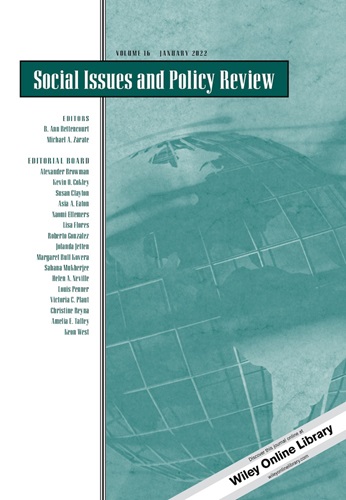The Single Factor Fallacy: Implications of Missing Critical Variables from an Analysis of Intergroup Contact Theory1
IF 5.6
1区 心理学
Q1 PSYCHOLOGY, SOCIAL
引用次数: 74
Abstract
The single factor fallacy occurs when social scientists model their applied work largely around a single factor. The problem generally arises when either a highly relevant theory is ignored or when missing key variables distort the results. Examples of this fallacy are drawn from the expanding research literature on intergroup contact, where we discuss the implications of missing critical variables from the analysis (including segregation, effects of negative as well as positive contact, extended contact, and contact when the outgroup is in the majority). The policy issues involved include racially desegregated schools, minority protest, the impact of neighborhood diversity, and anti-immigration voting. Three suggestions for avoiding the fallacy are emphasized—the use of mediation–moderation analysis, longitudinal research, and multilevel analysis. We end by outlining five simple principles, based on our own experience in the United States and the United Kingdom, that may increase the impact of social scientists’ research on public policy.单因素谬误:群体间接触理论分析中缺失关键变量的含义
当社会科学家主要围绕单一因素对他们的应用工作进行建模时,就会出现单因素谬误。当高度相关的理论被忽略或缺少关键变量扭曲结果时,通常会出现问题。这种谬论的例子来自于越来越多的关于群体间接触的研究文献,在这些文献中,我们讨论了分析中缺少关键变量的含义(包括隔离,消极和积极接触的影响,扩展接触,以及当外群体占多数时的接触)。涉及的政策问题包括取消种族隔离的学校、少数民族抗议、社区多样性的影响以及反移民投票。强调了避免这一谬误的三个建议:使用中介-适度分析、纵向研究和多层次分析。最后,根据我们在美国和英国的经验,我们概述了五个简单的原则,这些原则可能会增加社会科学家研究对公共政策的影响。
本文章由计算机程序翻译,如有差异,请以英文原文为准。
求助全文
约1分钟内获得全文
求助全文
来源期刊

Social Issues and Policy Review
Multiple-
CiteScore
22.20
自引率
1.10%
发文量
9
期刊介绍:
The mission of Social Issues and Policy Review (SIPR) is to provide state of the art and timely theoretical and empirical reviews of topics and programs of research that are directly relevant to understanding and addressing social issues and public policy.Papers will be accessible and relevant to a broad audience and will normally be based on a program of research. Works in SIPR will represent perspectives directly relevant to the psychological study of social issues and public policy. Contributions are expected to be review papers that present a strong scholarly foundation and consider how research and theory can inform social issues and policy or articulate the implication of social issues and public policy for theory and research.
 求助内容:
求助内容: 应助结果提醒方式:
应助结果提醒方式:


